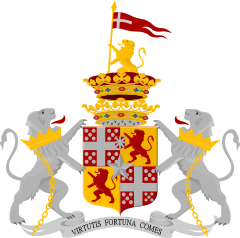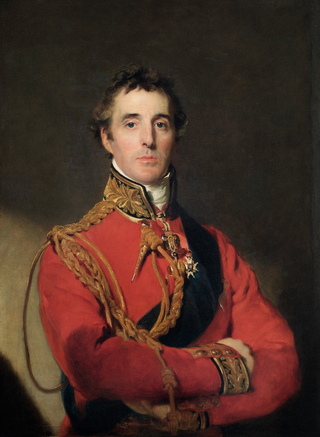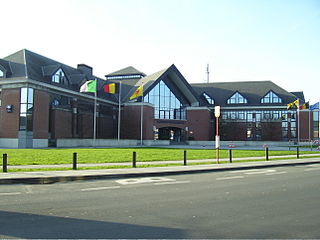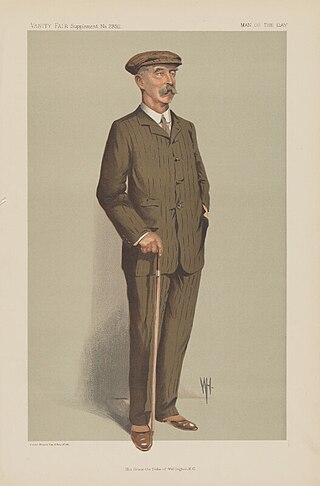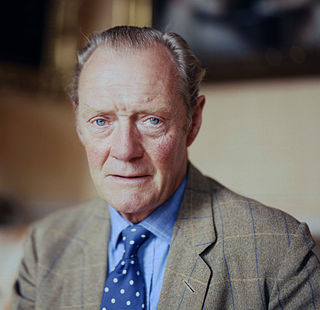| Baron Mornington of Mornington, 1746 | |
Richard Colley Wesley
1690–1758
1st Baron Mornington | | | | | | | |
| | | | |
| Earl of Mornington and Viscount Wellesley, of Dangan Castle in the County of Meath, 1760 | |
Richard Colley Wesley
1735–1781
1st Earl of Mornington and Viscount Wellesley,
2nd Baron Mornington | | | | | | | |
| | | | | | | | | | | | | | | | | | | | | | | Baron Wellesley of Wellesley in the County of Somerset, 1797
Marquess Wellesley of Norragh, 1799 | | Baron Maryborough of Maryborough in the Queen's County, 1821 | | Viscount Wellington (UK), 1809
Count of Vimeiro (Portugal), 1811
Marquess of Wellington (UK), 1812
Duke of Ciudad Rodrigo (Spain), 1812
Duke of Victoria and Marquess of Torres Vedras (Portugal), 1812
Duke of Wellington (UK) and Marquess Douro and Baron Douro (Portugal), 1814
Prince of Waterloo (Netherlands), 1815 | |
Richard Wellesley
1760–1842
Marquess Wellesley, 2nd Earl of Mornington and Viscount Wellesley, 3rd Baron Mornington, Baron Wellesley | | William Wellesley-Pole
1763–1845
3rd Earl of Mornington and Viscount Wellesley, 4th Baron Mornington, 1st Baron Maryborough | | Arthur Wellesley
1769–1852
1st Duke of Wellington, Duke of Victoria, Prince of Waterloo, Duke of Ciudad Rodrigo, Marquess of Wellington, Marquess of Torres Vedras, Marquess Douro, Viscount Wellington, and Baron Douro | |
| Marquessate Wellesley and Barony Wellesley extinct, 1842 | | | | | | | | | | | | | | | | | | | | | | | | | William Pole-Tylney-Long-Wellesley
1788–1857
4th Earl of Mornington and Viscount Wellesley, 5th Baron Mornington, 2nd Baron Maryborough | | Arthur Richard Wellesley
1807–1884
2nd Duke of Wellington, Duke of Victoria, Prince of Waterloo, Duke of Ciudad Rodrigo, Marquess of Wellington, Marquess of Torres Vedras, Marquess Douro, Viscount Wellington, and Baron Douro,
6th Earl of Mornington and Viscount Wellesley | | Lord Charles Wellesley
1808–1858 | |
| | | | | | | | | | | | | | | | | | | | | | | | | | | | William Pole-Tylney-Long-Wellesley
1813–1863
5th Earl of Mornington and Viscount Wellesley, 6th Baron Mornington, 3rd Baron Maryborough | | Henry Wellesley
1846–1900
3rd Duke of Wellington, Duke of Victoria, Prince of Waterloo, Duke of Ciudad Rodrigo, Marquess of Wellington, Marquess of Torres Vedras, Marquess Douro, Viscount Wellington, and Baron Douro,
7th Earl of Mornington and Viscount Wellesley | | Arthur Charles Wellesley
1849–1934
4th Duke of Wellington, Duke of Victoria, Prince of Waterloo, Duke of Ciudad Rodrigo, Marquess of Wellington, Marquess of Torres Vedras, Marquess Douro, Viscount Wellington, and Baron Douro,
8th Earl of Mornington and Viscount Wellesley | |
| | | | Barony Maryborough extinct, 1863 | | | | | | | | | | | | | | | | | | | | | | | | | Arthur Charles Wellesley
1876–1941
5th Duke of Wellington, Duke of Victoria, Prince of Waterloo, Duke of Ciudad Rodrigo, Marquess of Wellington, Marquess of Torres Vedras, Marquess Douro, Viscount Wellington, and Baron Douro,
9th Earl of Mornington and Viscount Wellesley | | Gerald Wellesley
1885–1972
7th Duke of Wellington, Duke of Victoria, Prince of Waterloo, Duke of Ciudad Rodrigo, Marquess of Wellington, Marquess of Torres Vedras, Marquess Douro, Viscount Wellington, and Baron Douro,
8th Duke of Ciudad Rodrigo, 10th Earl of Mornington and Viscount Wellesley | |
| | | | | | | | | | | | | | | | | | | | | | | | | | | | Anne Rhys
1910–1998
7th Duchess of Ciudad Rodrigo | | Henry Valerian George Wellesley
1912–1943
6th Duke of Wellington, Duke of Victoria, Prince of Waterloo, Duke of Ciudad Rodrigo, Marquess of Wellington, Marquess of Torres Vedras, Marquess Douro, Viscount Wellington, and Baron Douro,
11th Earl of Mornington and Viscount Wellesley | | Arthur Valerian Wellesley
1915–2014
8th Duke of Wellington, Duke of Victoria, Prince of Waterloo, Marquess of Wellington, Marquess of Torres Vedras, Marquess Douro, Viscount Wellington, and Baron Douro,
9th Duke of Ciudad Rodrigo, 12th Earl of Mornington and Viscount Wellesley | |
| | | | | | | | | | | | | | | | |
| | | | | | | | | | | | Arthur Charles Valerian Wellesley
b. 1945
9th Duke of Wellington, Duke of Victoria, Prince of Waterloo, Marquess of Wellington, Marquess of Torres Vedras, Marquess Douro, Viscount Wellington, and Baron Douro,
10th Duke of Ciudad Rodrigo, 13th Earl of Mornington and Viscount Wellesley | |
| | | | | | | | | | | | | | | | |
| | | | | | | | | | | | Arthur Gerald Wellesley
styled Marquess of Douro
b. 1978 | |
| | | | | | | | | | | | | | | | |
| | | | | | | | | | | | Arthur Darcy Wellesley
b. 2010
styled Earl of Mornington | |
|
